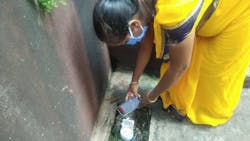PUNE, INDIA -- Cranberry Analytics Pvt. Ltd., a technology enabled analytics company that works in the area of water measurement in Pune’s Pimpri Chinchwad Municipal Corporation (PCMC) region today reported that it has almost eliminated non-metered connections and unauthorized connections in the PCMC area. Non metered connections that numbered 27,888 in 2011-12 in the region have now been reduced to less than 974 connections. This has enabled a significant increase in both water bill distribution in the region that caters to a population of 23 lakh people.
The revamped billing has also helped the PCMC Water Department significantly improve its revenue collections. Revenue from metered collections has now grown to INR 43 crores in 2019-20. It was INR 23.6 crores in 2011-12 when Cranberry Analytics took upon this project and was declining every year.
Cranberry also highlighted that its use of data analysis and automation of processes has led to a significant reduction in consumer disputes and TAT (turn-around-time) of bill rectifications. From 10,642 disputes and bill rectifications in 2011-12, the number for 2019-20 has been reduced to 251. This has largely been due to the introduction of software and other processes by Cranberry that have helped PCMC’s Water Department reduce billing errors.
Announcing the operational improvements in water management in the PCMC region, Mr. Praveen Ladkat, Executive Engineer (Water), who heads water distribution said, “The PCMC Water Department has been one of the first in India to put in place a technology enabled integrated water measurement and management system enabled by Cranberry Analytics. Over the past five years, this has led us to streamline operations significantly by reducing non-billable connections, reduce water wastage and pilferage, grow metered connections and improve bill distribution. This has led to a significant reduction in consumer grievances and has also led to a sustainable growth in revenue.”
Adding to this, Shishir Thakur, Founder and CEO, Cranberry Tech said, “The introduction of software systems and large-scale data analytics has improved effective water measurement in the PCMC region and resulted in improvements on a year-on-year across key parameters. The biggest achievement for the PCMC water department has been that, despite an increase in population and per-capita water consumption, it has helped ensure that the overall quantum of distribution of piped water has not increased and has even shown a decrease in water demand. This shows that integrated water management solutions are critical to improving water-use efficiency and ensure that this finite natural resource is used judiciously and capably.”
Cranberry also announced that it had enabled PCMC Water Department improve its bill distribution from 55,462 in 2011-12 to 808,121 in 2019-20.
In the PCMC region itself, Cranberry tech is today helping save approx. 31,000 million liters of water every year and effectively measuring approx. 95,000 million liters of water every year. Equally importantly, the effective water measurement and billing system has curbed the water demand and brought it to a downward trend even with the consistent increase in population over last 5 years.
These benefits and outcomes should also be acknowledged in the context of decreasing per capita water availability every day. The average annual per capita water availability in the years 2001 and 2011 was assessed as 1816 cubic meters and 1545 cubic meters respectively. This may further reduce to 1486 cubic meters and 1367 cubic meters in the years 2021 and 2031 respectively. Not to disregard the fact that 92% of available freshwater is being used for agriculture, which is non-metered and unpaid. The balance 8% is distributed between industry & household consumption. In Mumbai for example, 24% of the 3,800 million liters of water supplied daily is unmetered. In Delhi that figure is closer to 40%. The national average is approximately 15%.



